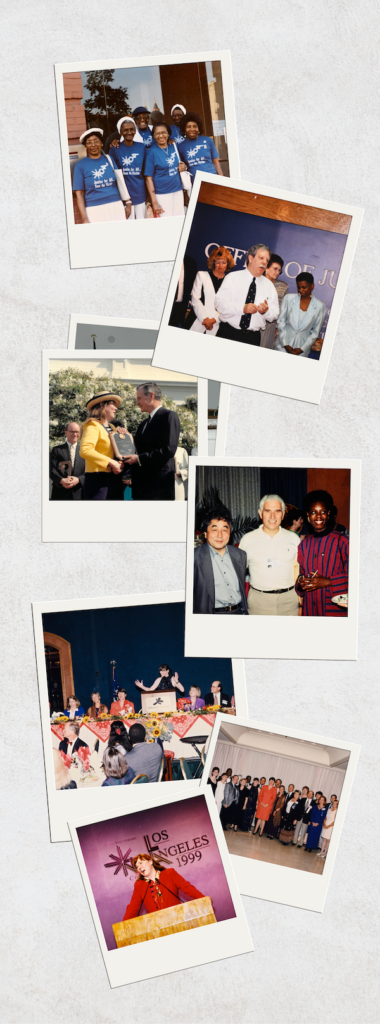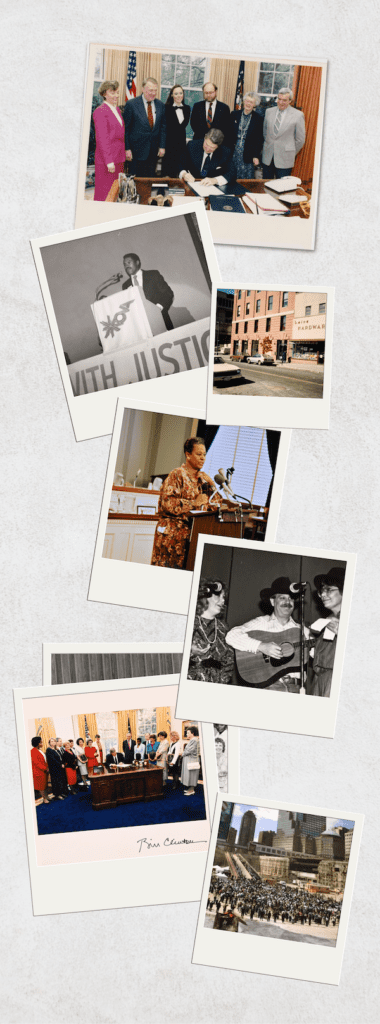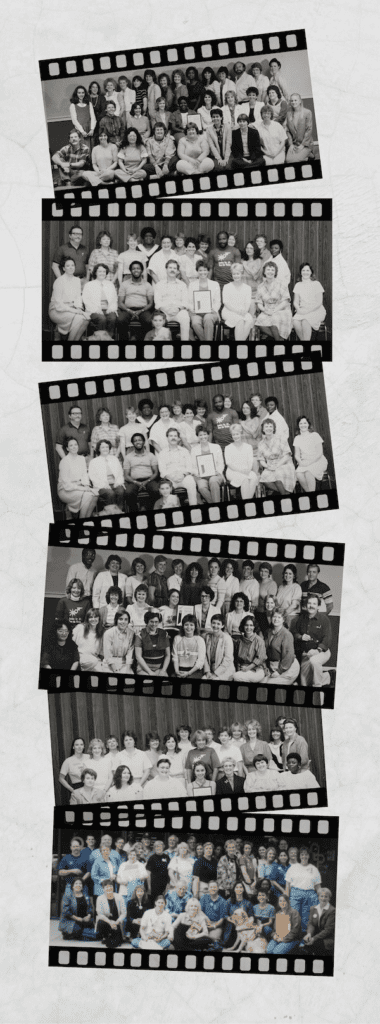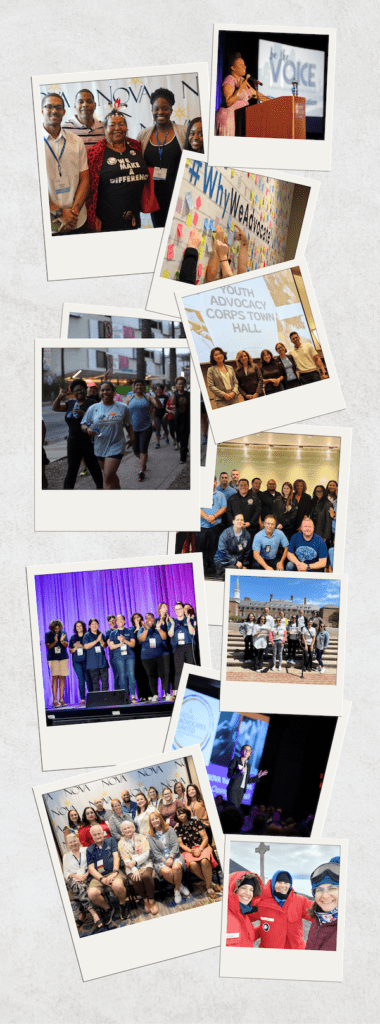Our History
Since 1975, NOVA has championed dignity and compassion for those harmed by crime and crisis. Keep reading to learn about our key milestones and accomplishments.
Click to skip ahead:
1974 – 1983 | 1984 – 1993 | 1994 – 2003 | 2004 – 2013 | 2014 – 2023 | 2024





Honoring Our Past, Imagining Our Future: Interviews with past NOVA Board Members and partners.
1974-1983
1974: The first national workshop on victim advocate programs was held in Fort Lauderdale, FL and served as the predecessor for the establishment of the National Organization for Victim Assistance (NOVA).
1975: The concept for NOVA as an organization is identified and, formally incorporated. NOVA’s initial contributions include promoting networking, national conferences, and providing training opportunities for individuals working with victims.
1976: The Second National Conference is held in Fresno, CA.
1979: Dr. Marlene Young serves as a Founding Board Member of NOVA (1979-1981) and becomes its first Executive Director in 1979 and leads the organization until 2005.
1980: NOVA incorporates the growing demand for victims to have legitimate access to the justice system into a new policy platform on victims’ rights and the initiation of a National Campaign for Victim Rights.
1980s: NOVA develops standards for victim service programs as a way to recognize the value of research. The process involved site visits to fifty programs recommended as excellent by practitioners in the field. They covered law enforcement-based and prosecutor-based programs, as well as independent, community-based programs.
1981: First National Victims’ Rights Week. It later became the National Crime Victims’ Rights Week. The original Presidential National Crime Victim Rights Week Proclamation hangs in NOVA’s headquarter offices in Alexandria, VA along with NOVA staff and Board Members present for the President Reagan’s signing.
1982: President Regan appoints a Task Force on Victims of Crime, which holds public hearings in six cities across the Nation to focus attention on the needs of crime victims. The Task Force is chaired by Hon. Lois Haight, currently a member of NOVA’s Honorary Advisory Board. The Task Force’s final report offers 68 recommendations that become the framework for advancing new programs and policies. The report also proposes an amendment to the U.S. Constitution providing that victims, “in every criminal prosecution shall have the right to be present and to be heard at all critical stages of judicial proceedings.”
1983: Then Assistant Attorney General Lois Haight establishes the Office for Victims of Crime (OVC) within the U.S. Department of Justice (DOJ) Office of Justice Assistance, Research and Statistics (OJARS) to implement recommendations from the President’s Task Force on Victims of Crime.
1984-1993
1984: NOVA prepares its first Legislative Directory on victim related legislation which was used to draft model legislation in 32 states as well as information for Congressional and state Legislative testimony.
1984: Congress passes the Victims of Crime Act (VOCA) which established the Crime Victims Fund made up of federal criminal fines, penalties, and bond forfeitures, to support state victim compensation and local victim assistance programs.
1985: NOVA coordinates a National Institute of Mental Health (NIMH) services research and evaluation colloquium on “The Aftermath of Crime: A Mental Health Crisis,” in Washington, DC.
1986: NOVA convenes a forum of more than 100 constitutional rights activists to refine a national plan to secure state constitutional amendments for crime victims in Washington, DC which led to the establishment of the National Victims’ Constitutional Amendment Network (NVCAN).
1986-1988: The OVC/NOVA Model Victim Assistance Program Brief was developed and served as a management tool for programs. It articulated eight basic services that programs should provide:
- Crisis intervention;
- Counseling and advocacy:
- Support during criminal investigations;
- Support during prosecution;
- Support after case disposition;
- Crime prevention;
- Public education; and
- Training of allied professions.
1987: NOVA publishes its first Crisis Response Manual, which was an expanded version of the first training outline from the same year. The second edition, titled Response to Communities in Crisis, was published in 1994 and includes content, agenda and guidelines for training to preparing to respond to a community crisis. Since this first training NOVA have provided crisis response training to over 16,000+ individuals both nationally and internationally.
1993: Then NOVA Executive Director, Dr. Marlene Young, publishes the manual Victim Assistance: Frontiers and Fundamentals, which becomes the definitive work on how to be an effective victim advocate, and sets standards for victim assistance program development and comprehensive services.
1993: NOVA develops the Code of Professional Ethics for Victim Assistance Providers which was approved by NOVA’s Board of Directors. The document was revised and approved in 2021 and has been adopted by multiple state victim assistance programs as well as the National Advocate Credentialing Program (NACP)®.
1994-2003
1994: OVC establishes the Community Crisis Response program using NOVA’s model, to improve services to victims in communities that have experienced a crime resulting in multiple violent victimizations.
1995: NOVA’s National Crisis Response Team deploys a team the same day to the site of the domestic terrorist bombing of the Oklahoma City Murrah Federal Building. NOVA sends multiple crisis response teams to support survivors, emergency responders and school children in the community.
2001: On September 11, 2001, two hijacked planes crash into the World Trade Center, another into the Pentagon, and a fourth into a field in Somerset County, Pennsylvania, killing 2,974 victims and injuring countless others in the worst terrorist attack in the United States. NOVA’s National Crisis Response Team deploys over 600 volunteers immediately following, and for nearly a year after assisting families at the NJ Family Assistance Center, Ground Zero, and at the sites of the Pentagon and Shanksville, PA.
2003: NOVA launches the National Advocate Credentialing Program (NACP)®, the first and only national credentialing program specific to crime victim advocates. Since 2003, NACP has received over 10,000 advocates’ applications for credentialing. The program would become the model for the Department of Defense Sexual Assault Advocate Certification Program (D-SAACP) in 2012.
2004-2013
2012: NOVA becomes the contractor for the DoD Sexual Assault Prevention and Response Office (SAPRO) new credentialing program, the DoD Sexual Assault Advocate Certification Program (D-SAACP), for military Sexual Assault Response Coordinators (SARCs) and Sexual Assault Prevention and Response Victim Advocates (SAPR VAs). As the Secretariat for D-SAACP, NOVA has successfully credentialed over 150,000 military SARCs and SAPR VAs.
2013: NOVA launches the online NOVA Victim Assistance Academy (NVAA). Pre-approved by NACP, the NVAA is a 40-hour, live, distance learning course designed to provide aspiring and new victim advocates with the core competencies for victim advocacy.
2014-2023
2015: NOVA launches the National Advocate Leadership Center (NALC) to provide professional development, training and support for our growing victim advocacy community.
2016: NOVA establishes an online, skill-based, 20-hour NOVA Campus Advocacy Training (NCAT) and a new NACP Specialty for Campus Advocates.
2017: NOVA’s National Crisis Response Team (CRT)™ deploys 5 of NOVA-trained crisis responders to Las Vegas, NV to support the survivors and community members in the aftermath of the mass shooting at the Route 91 Harvest Music Festival. NOVA also delivered for the first time several virtual crisis intervention education sessions.
2018: NOVA’s National CRT team deploys 13 NOVA-trained crisis responders to Santa Fe, TX to support the survivors and community members in the aftermath of the mass shooting at Santa Fe High School.
2019: NOVA establishes the Office for Victim Advocacy Ethics; the first and only national program dedicated to providing victim assistance professionals with TTA including trainings on ethical dilemmas, boundaries and confidentiality; ethical consultations; and tools for advocates and program leaders.
2019: NOVA, in partnership with the National Crime Victim Law Institute (NCVLI), receives a DOJ OVW Training and Technical Assistance (TTA) grant to provide TTA to community advocates and civilian criminal justice professionals advocating for military-connected survivors.
2019: NOVA launches the Human Trafficking Response Academy.
2020: NOVA expands its work with the DOJ Office on Violence Against Women (OVW) and institutions of higher education with a new training and technical assistance (TTA) grant to develop and sustain Campus Coordinated Community Response (CCR) teams. In 2021, NOVA is awarded another DOJ OVW campus TTA grant to develop resources to support campuses engaging historically marginalized and excluded communities.
2020: NOVA stands up a comprehensive, trauma-informed program, providing much-needed information, resources, connections and virtual support opportunities in response to the COVID-19 pandemic. Over 10,000 members of NOVA’s community participate in NOVA’s weekly virtual gatherings; connect with fellow advocates on discussion forums; and access self-care support through NOVA’s Touch Base Program. To increase accessibility, NOVA introduces a new chat feature on NOVA’s website, providing victims and community members with a discreet way to access help and resources.
2021: In partnership with the National Center on Missing and Exploited Children (NCMEC), NOVA launches it’s Child and Family Advocacy Academy (CFAA).
2021: NOVA partners with other national victim assistance groups to advocate for the VOCA Fix to Sustain the Crime Victims Fund Act of 2021 (VOCA Fix). NOVA continues to be a leader in advocating for federal and state policies that promote enforceable victims’ rights and sustainable victim assistance services.
2022: NOVA’s National Crisis Response Team (CRT)™ deploys 7 NOVA-trained crisis responders to Buffalo, NY to support the survivors and community members in the aftermath of the mass shooting at Tops grocery store.
2022: NOVA deploys 24 crisis responders to Uvalde, Texas just four weeks after Buffalo to respond to the mass shooting at Robb Elementary School. At the request of the community, NOVA’s CRT responders work the Family Assistance Center for 35 days after the tragedy.
2023: NOVA deploys a team of 6 crisis responders to Lewiston, Maine after a mass shooting. NOVA’s CRT responders include victim advocates and a responder trained in ASL interpretation to support members of the Deaf and Hard of Hearing community.
2023: NOVA expands its work with the military community through a new 5-year contract with the Department of Defense Military Community Advocacy (MCA) office to develop coordinated community response to domestic abuse prevention and response.
2024
NOVA changes its name to reflect NOVA’s commitment to uplifting the growing field of victim advocacy. NOVA is now the National Organization for Victim Advocacy.
NOVA launches the Victim Advocacy Corps (VAC) with funding from the Office for Victim of Crime (OVC). This pilot program aims to elevate the next generation of leaders in victim services by providing college students with victim advocacy training, credentialing, mentorship, and a nine-month, paid field-placement in a local victim service agency. The inaugural cohort of 17 student fellows, who represent multiple communities and bring unique experiences to their advocacy work, will convene for the first time in Washington, D.C. at the first-ever Victim Advocacy Corps Leadership Summit occurring at NOVA’s 50th Annual Training Event.
NOVA hosts the first-ever National Summit on the Professionalization of Victim Advocacy and the National Advocate Credentialing Program (NACP)® with over 25 national Subject Matter Experts in Alexandria, VA. A blueprint for the future of NACP and professional victim advocacy is developed during the summit.
Since the inception of NOVA’s community crisis response program, NOVA, trained crisis, responders, and staff have responded to over 260 communities in crisis by phone consultation, dissemination of materials and/or deployment of in-person crisis response teams.
Approaching NOVA’s 50th anniversary, NOVA’s staff consists of a dynamic group of professionals committed to victim advocacy. NOVA’s staff work together to provide victim advocates and crisis responders with critical, relevant, and supportive resources and training so victims of crime and crisis are well-supported.

